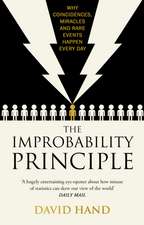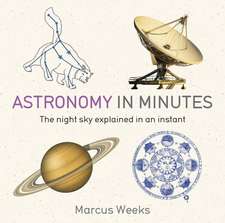Time for Science Education: How Teaching the History and Philosophy of Pendulum Motion can Contribute to Science Literacy: Innovations in Science Education and Technology, cartea 8
Autor Michael Matthewsen Limba Engleză Paperback – 31 oct 2000
Din seria Innovations in Science Education and Technology
- 24%
 Preț: 732.42 lei
Preț: 732.42 lei -
 Preț: 394.87 lei
Preț: 394.87 lei - 15%
 Preț: 636.80 lei
Preț: 636.80 lei -
 Preț: 390.63 lei
Preț: 390.63 lei -
 Preț: 386.22 lei
Preț: 386.22 lei -
 Preț: 381.98 lei
Preț: 381.98 lei -
 Preț: 383.93 lei
Preț: 383.93 lei -
 Preț: 391.02 lei
Preț: 391.02 lei -
 Preț: 397.16 lei
Preț: 397.16 lei - 15%
 Preț: 640.24 lei
Preț: 640.24 lei - 15%
 Preț: 639.41 lei
Preț: 639.41 lei - 18%
 Preț: 947.85 lei
Preț: 947.85 lei - 18%
 Preț: 962.66 lei
Preț: 962.66 lei -
 Preț: 379.86 lei
Preț: 379.86 lei - 15%
 Preț: 647.59 lei
Preț: 647.59 lei - 15%
 Preț: 649.39 lei
Preț: 649.39 lei -
 Preț: 393.35 lei
Preț: 393.35 lei - 15%
 Preț: 641.53 lei
Preț: 641.53 lei - 18%
 Preț: 900.94 lei
Preț: 900.94 lei - 18%
 Preț: 1000.70 lei
Preț: 1000.70 lei -
 Preț: 386.81 lei
Preț: 386.81 lei -
 Preț: 388.13 lei
Preț: 388.13 lei -
 Preț: 383.93 lei
Preț: 383.93 lei - 15%
 Preț: 585.73 lei
Preț: 585.73 lei -
 Preț: 394.87 lei
Preț: 394.87 lei -
 Preț: 392.97 lei
Preț: 392.97 lei
Preț: 897.33 lei
Preț vechi: 1094.30 lei
-18% Nou
Puncte Express: 1346
Preț estimativ în valută:
171.76€ • 180.45$ • 144.35£
171.76€ • 180.45$ • 144.35£
Carte tipărită la comandă
Livrare economică 12-26 martie
Preluare comenzi: 021 569.72.76
Specificații
ISBN-13: 9780306458804
ISBN-10: 0306458802
Pagini: 440
Ilustrații: XXVIII, 440 p. 27 illus.
Dimensiuni: 155 x 235 x 23 mm
Greutate: 0.63 kg
Ediția:Softcover reprint of the original 1st ed. 2000
Editura: SPRINGER NETHERLANDS
Colecția Springer
Seria Innovations in Science Education and Technology
Locul publicării:Dordrecht, Netherlands
ISBN-10: 0306458802
Pagini: 440
Ilustrații: XXVIII, 440 p. 27 illus.
Dimensiuni: 155 x 235 x 23 mm
Greutate: 0.63 kg
Ediția:Softcover reprint of the original 1st ed. 2000
Editura: SPRINGER NETHERLANDS
Colecția Springer
Seria Innovations in Science Education and Technology
Locul publicării:Dordrecht, Netherlands
Public țintă
ResearchCuprins
Acknowledgements. Preface. 1. Learning about the Pendulum and Improving Science Education. 2. Navigation and the Longitude Problem. 3. Ancient and Medieval Timekeeping. 4. Galileo and the Pendulum Clock. 5. Galileo's Analysis of Pendulum Motion. 6. Christiaan Huygens and the Pendulum Clock. 7. Perfecting Mechanical Timekeeping and Solving the Longitude Problem. 8. The Pendulum in Newton's Physics. 9. Clocks and Culture: The Clock Analogy in Philosophy and Theology. 10. Science and Philosophy: Some Lessons from the History of Pendulum Motion. 11. Teaching and Learning about Time and Pendulum Motion: Some Theoretical Considerations. 12. Teaching and Learning about Time and Pendulum Motion: Some Pedagogical Considerations. 13. Science Education and Culture. Endnotes. References. Credits.
Recenzii
`Michael Matthews ... has just published a book that should be read by all serious physics educationists. ... Given the lamentable lack of books on physics education that try to show how the history and philosophy of science can be incorporated into real physics, Matthew's book is highly recommended.'
Ivan Slade in Physics World, February 2001
`I recommend this wide-ranging and fascinating book to all science educators, and I hope that Matthew will publish a shortened version of it for science (physics) educators and classroom teachers. The story of the pendulum, as told here, would enliven the physics classroom and make it reach beyond the textbook.'
CJSMTE/RCESMT, 1:4 (2001)
`Mathew's book is a true work of scholarship and I have no hesitation in urging anyone interested in informing debates about science education to read it from cover to cover.'
Studies in Science Education
Ivan Slade in Physics World, February 2001
`I recommend this wide-ranging and fascinating book to all science educators, and I hope that Matthew will publish a shortened version of it for science (physics) educators and classroom teachers. The story of the pendulum, as told here, would enliven the physics classroom and make it reach beyond the textbook.'
CJSMTE/RCESMT, 1:4 (2001)
`Mathew's book is a true work of scholarship and I have no hesitation in urging anyone interested in informing debates about science education to read it from cover to cover.'
Studies in Science Education












